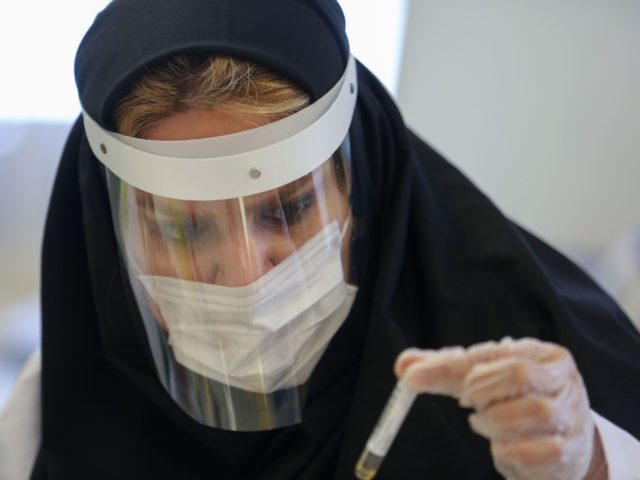Iranian state media said on Sunday a locally-produced coronavirus medication will be available for purchase on store shelves just three weeks from now.
The statement from the Iranian government also claimed, despite a mountain of gruesome evidence to the contrary, that Iran has done an exemplary job of containing the coronavirus with little help from the outside world.
The Jerusalem Post translated the statement from Iranian Vice President for Science and Technology Sorena Sattari, who made his remarks while visiting a technology park in central Iran.
Sattari praised the firms operating out of the park for their tremendous contributions to containing the pandemic, claiming they have been able to “meet nearly all domestic needs for necessary equipment.”
Sattari said Iranian “innovation and technological knowhow” helped turn the coronavirus crisis around after an outbreak in the holy city of Qom that grew so bad the regime could no longer conceal it, although a spirited effort was made to undercount deaths and silence Iranians who demanded to know the truth.
“We have imported almost no equipment required to fight coronavirus. During the coronavirus outbreak, knowledge-based companies tapped into their potential and met domestic need without reliance on imports,” Sattari said.
“Iran produces masks, medical equipment, and ventilators domestically, and during this period, not even a single ventilator, which has a complex manufacturing process, has been imported into the country,” he declared.
In truth, Iranian state media reported in March that almost 2,000 ventilators were imported from other countries, and it did not unveil its first domestically-produced ventilator until May. Also, despite frequent Iranian complaints to the contrary, U.S. sanctions in Iran have never prevented it from acquiring coronavirus supplies.
The U.S. Treasury Department stressed in official documents that “most medicine and medical devices, including certain personal protective equipment and other items used for COVID-19-related treatment such as medical gowns, medical eyeshields and goggles, surgical gloves, face shields, certain respirators and masks such as N95, N99, and N100 masks, and certain ventilators already qualify for export and re-export to Iran.”
The U.S. State Department repeated in April that Iran’s complaints about being blocked from obtaining vital medical equipment to fight the coronavirus are completely false, and pointed out that Iran has abundant funds in its National Development Fund to buy medicine for its people, even though the regime frequently complains the sanctions left it without the money needed for such purchases. The State Department further noted that Iran refused to accept American offers of medical assistance.
As for the locally-produced coronavirus medicine Sattari boasted of producing, Iran’s Health Minister Saeed Namaki said two weeks ago that Iran would soon begin producing Remdesivir, the broad-spectrum antibiotic treatment that has shown some promise against the coronavirus in Western clinical trials.
Iran’s Food and Drug Administration confirmed on Monday that Remdesivir is among the medicines Iran plans to begin producing, supposedly at a third of the cost of foreign supplies, and claimed homegrown doses will be distributed to hospitals within the next few days.
Iran’s production of Remdesivir is not entirely “local” as Sattari boasted, since an Indian pharmaceutical company is helping the Iranians get their production chain established.

COMMENTS
Please let us know if you're having issues with commenting.